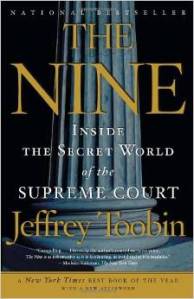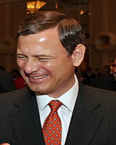 In The Nine, acclaimed journalist Jeffrey Toobin takes us into the chambers of the most important—and secret—legal body in our country, the Supreme Court, revealing the complex dynamic among the nine people who decide the law of the land. An institution at a moment of transition, the Court now stands at a crucial point, with major changes in store on such issues as abortion, civil rights, and church-state relations. Based on exclusive interviews with the justices and with a keen sense of the Court’s history and the trajectory of its future, Jeffrey Toobin creates in The Nine a riveting story of one of the most important forces in American life today.
In The Nine, acclaimed journalist Jeffrey Toobin takes us into the chambers of the most important—and secret—legal body in our country, the Supreme Court, revealing the complex dynamic among the nine people who decide the law of the land. An institution at a moment of transition, the Court now stands at a crucial point, with major changes in store on such issues as abortion, civil rights, and church-state relations. Based on exclusive interviews with the justices and with a keen sense of the Court’s history and the trajectory of its future, Jeffrey Toobin creates in The Nine a riveting story of one of the most important forces in American life today. 






 Discussion Questions:
Discussion Questions:
1. Have — as Toobin argues — the retirement of Sandra Day O’Connor and the subsequent appointments of John Roberts and Samuel Alito effectively established a “conservative majority” on the court?
2. How predictable are the judicial philosophies — and practices — of Supreme Court justices (past and present)? “Are the unpredictable personal dynamics among the justices more important than the agenda they brought with them?”
3. How did the election of Barack Obama influence the court? What about his appointments Kagen and Sotomayor (who replaced Stevens an Souter) Will this change the composition of the Court?
4. What is the “Constitution in Exile?” How does it relate to the court’s history…and its future?
5. What is the function of the judiciary in the US government? How did John Marshall in Marbury v. Madison (1803) shape the court’s relationship with the legislative and executive branches?
6. What role does politics play in judicial appointments?
7. How does O’Connor’s pragmatism differ from Scalia’s originalist/constructionist perspective? How would each defend her/his position? How would each rebuke the other’s?
8. Toobin quotes Rehnquist (on page 237): “Don’t worry about the analysis and principles in the case. Just make sure that the result is a good one this time around – because those principles you announce will be ignored in the next case.” Why did Rehnquist say that?
9. How much weight should the court give to precedent (stare decisis)? What role, or lack of role, did stare decisis have in the homosexual cases (Hardwick and Lawerence v Texas)?
10. What, if any, role should international law play in Supreme Court decisions?
11. What was your overall opinion of the Court before you read this? After you read it? Did it make you feel better? Worse?
12. Did Toobin do a good job portraying the justices? Did they become “real” to you? What surprisedyou the most about them? O’Connor – Thomas – Rehnquist — Souter – Scalia – Stevens –Kennedy – Ginsburg – Breyer?
13. What was the most surprising thing you learned from reading this book?
14. Should the court take into account what the American people think or should they strictly interpret by the Constitution?
15. Which judge did you admire most after reading this? Why? Who was the worst one, in your opinion? Why?

as someone said earlier, some law school “helps” in order, not to read the book, but to get your questions! too technical and exclusive for me … the questions I had in mind were quite faraway from your 11.
LikeLike
I have another set of discussion questions that may be less law school-esque. I’ll try to post them soon.
The questions are just for discussion, I swear there will be no test.
I hear your concerns though. Something I’ve always worried about with this book selection.
LikeLike
Thank you ! very thoughtful
Will I be able to ask simple questions ?
LikeLike
Updated questions. Left the more esoteric ones, added some of a more general nature.
LikeLike
Absolutely. There are no simple questions. We are there to discuss.
LikeLike